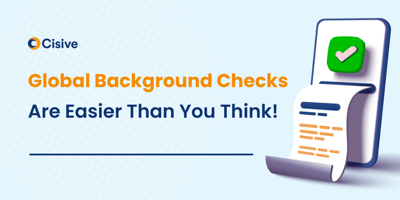

U.S.-based companies invest trillions of dollars every year in foreign direct investments as they...

Globalization and outsourcing have led many US-based organizations to expand their business operations internationally and increase their hiring of employees located outside of the US. Employers are also screening a growing number of US based candidates who have lived, worked, or studied outside of the US. Screening these populations brings an additional challenge: conducting an international background check.
The need for international screening occurs when:
Conducting screening outside of the US, and importing screening data to the US, creates challenges, since data sources and the availability and reliability of information can be different in each jurisdiction searched.
Employment screening is still evolving in some countries. In the US, and in some other countries, there is a very mature market and support system for employment background screening. Screening is common and there are robust mechanisms to obtain the information needed for the background screen. However, in some locations, employment screening may not be well understood. Employers, educational institutions and public agencies may not be familiar with providing data in a pre-employment screening context. What does this mean for the employer? A great deal, especially if they are screening in an undeveloped market. For example, US employers are used to obtaining education verifications very quickly and by providing minimal information. In some African countries, the school records can be paper based. The verifier at the school may be a specific person, who will process verifications requests on a limited basis and only with a specific set of requirements. That education verification may require much more information, such as copies of consent, ID, diploma, and take a few weeks.
If the employer is based in the US, in order to maintain a hiring program that is non-discriminatory and focused on risk-based screening, conducting a thorough background check on a candidate, no matter what their residence history has been, is crucial. A candidate who has lived in a foreign country within the past 5-10 years could have important and relevant issues that will not show up on a background screen focused only on their US history. In these situations, international background checks can find vital information about criminal history, employment history, education, and even national security concerns.
International background check screening is important and complex. Each country that data is pulled from will have different procedures and regulations, as well as challenges. Inn some countries there may be cultural or legal challenges. A background check may be considered invasive, with certain elements not allowable for screening all but a few positions. For example in Singapore, there is no way to legally access court or criminal records for the purpose of employment background screening. Other methodologies, including commercial database checks, can offer an alternative, although they will be less than comprehensive when compared to a background check at the source.
In other countries, especially those with a history of totalitarian or oppressive government, the term background check may have negative connotations. The term vetting or verification may be the preferred name for the screening process, since the term “background check” may be seen as being a check for criminality only.
More companies are getting to the point where they need to look beyond country borders with their background checks. In 2017, Forbes reported the number of employers open to hiring workers from overseas increased 21% from the year before. This statistic indicates a trend toward a globalized workforce in the United States, which will demand an increasingly globalized background check strategy as well.
We recommend that companies should, screen their candidates at the same level of screening, no matter where the candidate lived. In some cases this means, at a minimum screening international candidates for criminal records (where allowable and available), employment records and educational records. Why? There are two important and potentially costly reasons:
To verify candidate experience and education. Some candidates try to cheat the system, no matter where their history is. If the candidate knows the confirmation is more difficult to obtain, the risk of discovery is less.
To ensure legal compliance. Not verifying applicants’ foreign experience creates an inconsistency in your hiring process. In some countries, such as the US, this may lead to claims of discriminatory hiring practices. For example, if you run a domestic background check on two applicants for the same position and one of them claims to have a degree from a foreign institution, you will end up checking the educational claim of only one of the candidates, potentially exposing your company to litigation. Additionally, negligent hiring claims can arise when an employee causes harm to another employee and your company cannot demonstrate that it exercised due diligence when evaluating that worker’s fitness for the job.
The legal implications of international background screening involve the intersection of U.S. and foreign laws and, as we mentioned previously, they can be extraordinarily complex. It is important to understand both the laws that apply in both the U.S. and the relevant foreign country.
For example, the obligations of the Fair Credit Reporting Act (FCRA) still apply for international screening. If you’re working with a vendor partner to outsource international screening on a US resident, the vendor has an FCRA obligation to take reasonable procedures to ensure maximum possible accuracy. Not all vendors outside of the US are held to this standard. If there is a negative public record, then there is an obligation, no matter what country is involved, to make sure the information is correct and up to date. Additionally, local data protection or labor laws may need to be adhered to.
It’s also important to know and understand the country’s data-privacy regulations, such as the EU’s country specific General Data Protection Regulations (GDPR). Even if you are screening US residents, foreign regulations may apply. If you are screening individuals in other countries, their laws may likely apply. The screening process involves processing personally identifiable information which will be regulated by data protection laws.
If you are looking for a background screening provider to manage your global screening program, look no further. Cisive is experienced in performing the most thorough, compliant and accurate background checks throughout the globe. With more than 600+ full-time, research staff in seven global locations across the United States, Europe, and Asia, we provide unrivaled capabilities to effectively navigate the concurrent global legislation that governs background screening.
Cisive is compliant with GDPR and other data privacy and protection legislation. We continuously monitor both domestic and international legal developments with regard to data protection and privacy and regularly implement changes to ensure we protect client and applicant data to levels above those required in all the regions in which we operate.
Cisive offers a single global platform and a flexible solution to support international and domestic requirements including multi-language capabilities. Cisive’s solution reduces costs, speeds up time to fill, and increases productivity. With our seamless integration to the top 30 Applicant Tracking Systems, enterprise clients can experience a truly turnkey solution.
If you have not yet experienced the benefits of Cisive and are interested in learning more about our international screening capabilities, please contact us at 1-866-557-5984 or email info@cisive.com.

U.S.-based companies invest trillions of dollars every year in foreign direct investments as they...

In this Cisive Product Highlight series, we review key tools to consider when screening your...

There are hundreds of background check companies, but not all of them offer a robust international...